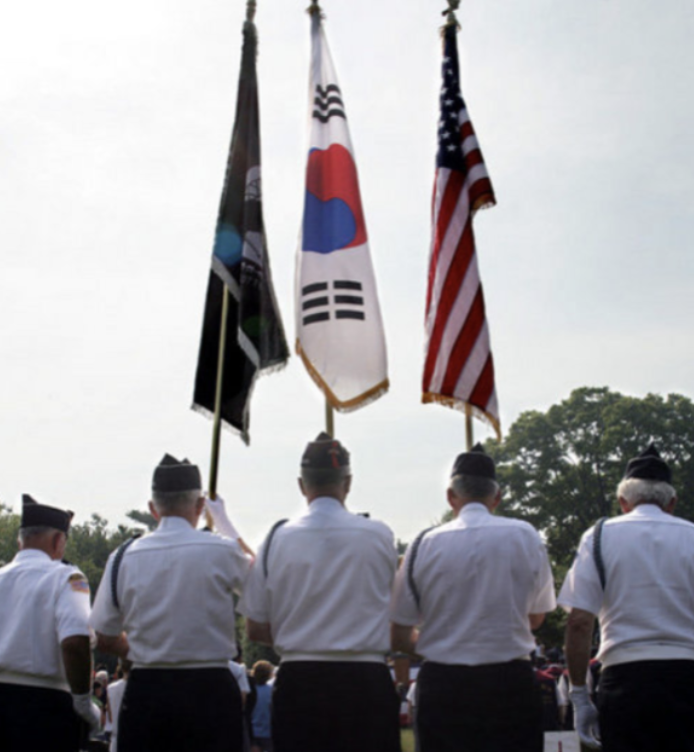It goes without saying that the rise of the Republic of Korea, a fledgling newborn country back in 1948 as one of the poorest countries in the post-WWII world, to one of the prosperous economies ranking among the top-most OECD nations today has owed so much to its two pillars of support from outside, its alliance with the United States of America and cooperation with Japan. Unfortunately however, these two pillars are now found crumbling.

The U.S. and the ROK have been unable to fully resolve the crucial issue of burden-sharing in support of the U.S. forces stationed in Korea, causing many Korean workers at U.S. bases in Korea to be furloughed. The issue of burden-sharing is not the single-most thorny issue confronting the two allies, however: There are, among others, such critical issues as the transfer of the war-time operational control of Korean forces, the extension of the Korea-Japan GSOMIA (General Security of Military Information Agreement), the dispatch of the Korean expeditionary forces to the Hormuz Strait and the operation of the U.S. THAAD (Terminal High Altitude Area Defense) batteries currently deployed in the Republic of Korea that force the two allies to be at a snail’s pace as they try to have them resolved.
Nonetheless, these are but the tip of an iceberg observed above the surface of the sea, as the two countries are found to be recently suffering from an erosion of the “shared values” and the “mutual trust,” the two key cornerstones that underpin the alliance that have lasted for the past 67 years.
The alliance that binds the two countries began floundering, however, as unforeseen developments took place in the Republic of Korea that featured the emergence of left-leaning and pro-North Korean governments. Following two left-leaning governments, one led by President Kim Dae Jung (1998∼2003) and the other by President Roh Moo Hyun (2003∼2008), the Republic of Korea saw in 2017 yet another left-leaning government led by President Moon Jae In come to power, causing cracks in her ties with the U.S. as the Moon government pursued, in dealing with the perennial North Korean nuclear issue among other things, a policy of appeasement at the risk of sacrificing the “common values” and the “mutual trust,” the two basic foundations of the alliance.
The entry of President Donald J. Trump into the White House in Washington in January 2017 that preceded the takeover of the Blue House by President Moon in Seoul in May the same year would foreshadow a further strained relationship between the two countries.
It is highly likely that the parliamentary election in the Republic of Korea slated for April 15 will serve as a major determinant in shaping the alliance between the two countries in the years to come, as two major parties are competing for control of the legislature; the ruling ‘Deobureo Minju-dang (Democratic Party)’ which is committed to a readjustment of the alliance with the United States in favor of appeasement with North Korea and China and the opposition ‘Mirae Tonghap-dang (United Future Party) that calls for a fully normalized alliance with the U.S. There is a strong likelihood that, should the opposition United Future Party turn out to be the winner of the parliamentary election, the Moon government will find it difficult, if not impossible to continue pursuing its hitherto left-leaning domestic as well as foreign policies.
In the meantime, the relationship that developed between the ROK and Japan ever since their diplomatic normalization in 1965 has all along been an appendage to the ROK-U.S. alliance, remaining primarily focused economic collaboration short of being elevated to a military partnership, due to issues related to Japan’s colonial occupation of Korea. The diplomatic rift that flared between Seoul and Tokyo toward the end of the last year over the extension of GSOMIA was clearly a manifestation of a relationship lacking in “common values” and “mutual trust” between the two countries. As is the case with the ROK-U.S. alliance, the future evolution of the Korea-Japan relationship looks fated to be affected by the outcome of the parliamentary election in the Republic of Korea slated to be held on April 15.
Dong-bok Lee is a Senior Research Fellow at the New Asia Research Institute, President of the North Korean Democratization Forum, Senior Associate (Non-Resident) at the Center for Strategic and International Studies (CSIS), was formerly a member of the ROK National Assembly, and for over twenty years a member of the ROK delegation to high-level North Korea-South Korea talks.


